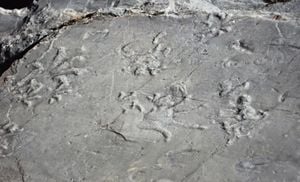Rare unpublished wartime papers authored by the legendary codebreaker Alan Turing are at the center of attention, following an export ban to keep these significant documents within the UK. Turing, who played a pivotal role during World War II, is best known for breaking the Enigma code and the new export ruling has been established to find a domestic buyer willing to purchase these invaluable papers, valued at nearly £400,000.
The collection is tied to the 'Delilah' project, which aimed to create portable encryption systems for military operations. Arts Minister Sir Chris Bryant emphasized the importance of these documents, describing them as offering “unique insights” about Turing’s extraordinary mind.
The Delilah machine, successfully demonstrated by Turing post-World War II, signified advancements made for encrypting communications over the radio and telephone networks. The documents not only encompass Turing’s notes but also those of his collaborator Donald Bayley, making this collection particularly significant as unpublished evidence of Turing's work is quite rare.
The ban on exportation stemmed from the recommendation of the Reviewing Committee on the Export of Works of Art, who noted the papers' connection to Britain’s national history and their significance to the study of computing. According to the committee's chairman, Andrew Hochhauser, Turing's contributions are monumental, and the UK owes him “a debt of gratitude” for his efforts during the war.
The documents span from 1943 to 1945 and illuminate some of Turing's most inventive and clandestine work, accentuating not only his genius but also the desperate need for advancements during wartime. Turing typically did not maintain extensive research notes, making these documents all the more cherished.
Minister Bryant added, “The British mathematician was central to the development of our modern digital world.” He stressed the importance of establishing opportunities for people to study Turing’s work as it forms part of the national narrative.
Included within the papers are two bound notebooks alongside six loose sheets containing observations and calculations related to the Delilah project. This project culminated with Turing showcasing the Delilah machine, which was able to encrypt and decrypt messages, demonstrating its utility to military operations.
The historical value these documents represent is underscored by the reality of Turing’s legacy; he is not just recognized as a war hero but is also often referred to as the father of computer science and artificial intelligence. His achievements at Bletchley Park during the war were instrumental to the Allies' successes and have shaped the foundation of modern computing.
Artistically commemorated, Turing's contributions continue to be celebrated today; he features prominently on the current £50 note. His legacy was cemented when he was voted the most iconic person of the 20th century by BBC audiences, illustrating the deep admiration and respect for his intellect and innovations.
Potential buyers interested in acquiring the papers are encouraged to reach out to the Reviewing Committee. The export licence application will remain under consideration until November 15, providing opportunities for institutions or individuals to preserve these historic pieces for future generations.
This decision to preserve Turing's wartime documentation not only honors his exceptional contributions but also ensures they remain accessible to scholars and enthusiasts dedicated to studying his influential work. Following the outcome, discussions surrounding Turing's legacy and its relevance to our contemporary world will undoubtedly continue to thrive.



